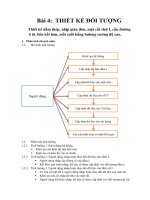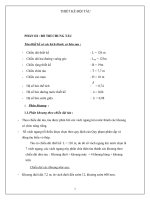Factory (THIẾT kế đối TƯỢNG SLIDE)
Bạn đang xem bản rút gọn của tài liệu. Xem và tải ngay bản đầy đủ của tài liệu tại đây (324.6 KB, 54 trang )
Factory Patterns
"Baking with OO Goodness"
1
The Constitution of Software Architects
• Encapsulate what varies
• Program through an interface not to an
implementation
• Favor Composition over Inheritance
• Classes should be open for extension but closed for
modification
• ?????????
• ?????????
• ?????????
• ?????????
• ?????????
2
"new" = "concrete"
• Design Principle: "Program through an interface
not to an implementation"
• However, every time you do a "new" you need to
deal with a "concrete" class, not an abstraction.
Duck duck = new MallardDuck();
We want to use
interfaces to keep
code flexible
But we have to
create an instance
of a concrete class
With a whole set of related
concrete classes:
Duck duck;
if (picnic)
duck = new
MallardDuck();
else if (hunting)
duck = new DecoyDuck();
else if (inBathTub)
duck = new RubberDuck();
}
not "closed for modification"
What's wrong with this? What principle is broken here?
3
What can you do?
• Principle: Identify the aspects that vary and
separate them from what stays the same.
• How might you take all the parts of your application
that instantiate concrete classes and separate or
encapsulate them from the rest of your application?
4
Identifying aspects that vary
• Order pizza in a pizza store in cutting edge Objectville!
public class PizzaStore {
Pizza orderPizza() {
Pizza pizza = new
Pizza();
pizza.prepare() ;
pizza.bake();
pizza.cut();
pizza.box();
return pizza;
For flexibility it would be nice if
this wasn’t concrete, but we can’t
instantiate abstract classes!
Prepare the pizza
}
}
5
Identifying aspects that Vary
• But you need more than one type of pizza:
public class PizzaStore {
Pizza orderPizza(String type) {
Pizza pizza;
Pass in the type of Pizza to
orderPizza()
if (type.equals("cheese") {
Instantiate based on type of pizza
pizza = new CheesePizza();
} else if (type.equals("greek")) {
Pizza
pizza = new GreekPizza();
} else if
+ prepare()
(type.equals("pepperoni") {
+ bake()
pizza = new PepperoniPizza();
+ cut()
+ box()
}
pizza.prepare() ;
pizza.bake();
pizza.cut();
pizza.box();
return pizza;
}
}
CheesePizza
GreekPizza
PepperoniPizza
6
But the pressure is on
to add more pizza types….
• Need to add a couple trendy pizzas to their menu:
Clam and Veggie.
• Greek is not selling so well – so take it out!
• What do you think would need to vary
and what would stay constant?
7
Modified orderPizza()
Pizza
+ prepare()
+ bake()
+ cut()
+ box()
CheesePizza
This is what varies
This code is not
closed for
modification!
PepperoniPizza
ClamPizza
VeggiePizza
public class PizzaStore {
Pizza orderPizza(String type) {
Pizza pizza;
if (type.equals("cheese") {
pizza = new CheesePizza();
} else if (type.equals("greek"))
{
pizza = new GreekPizza();
} else if
(type.equals("pepperoni") {
pizza = new PepperoniPizza();
} else if (type.equals("clam") {
pizza = new ClamPizza();
} else if (type.equals("veggie")
{
pizza = new VeggiePizza();
This is what we expect
will stay the same
}
pizza.prepare();
pizza.bake();
pizza.cut();
8
pizza.box();
Encapsulating Object Creation
• Move the object creation out of the orderPizza() method.
• How?
– Move the creation code into a special purpose object that is concerned
with only creating pizzas
public class PizzaStore {
Pizza orderPizza(String
type) {
Pizza pizza; pull it out
pizza.prepare();
pizza.bake();
What’s going
pizza.cut();
to go here?
pizza.box();
return pizza;
}
}
if (type.equals("cheese") {
pizza = new CheesePizza();
} else if
(type.equals("pepperoni") {
pizza = new PepperoniPizza();
} else if (type.equals("clam") {
pizza = new ClamPizza();
} else if (type.equals("veggie") {
pizza = new VeggiePizza();
}
We place this code into a separate
object SimplePizzaFactory
9
Building a Simple Pizza Factory
Factories handle the details of the object creation.
public class SimplePizzaFactory {
public Pizza createPizza(String type)
{
Pizza pizza = null;
if (type.equals("cheese") {
pizza = new CheesePizza();
} else if
(type.equals("pepperoni") {
pizza = new PepperoniPizza();
} else if (type.equals("clam") {
pizza = new ClamPizza();
} else if (type.equals("veggie") {
pizza = new VeggiePizza();
}
return pizza;
}
}
Here’s code we plucked out
of the orderPizza() method.
Code is still parameterized
by the type of pizza.
Could this method be made static?
10
Reworking the PizzaStore class
PizzaStore has a
public class PizzaStore {
reference to the factory
SimplePizzaFactory factory;
public PizzaStore(SimplePizzaFactory factory)
{
this.factory = factory;
PizzaStore gets the
}
factory passed in the
constructor
public Pizza orderPizza(String type) {
Pizza pizza;
pizza = factory.createPizza(type);
pizza.prepare();
new operator replaced
pizza.bake();
by create method!
pizza.cut();
pizza.box();
return pizza;
}
}
11
Why is this better?
• SimplePizzaFactory may have many more
clients than orderPizza() method
– PizzaShopMenu, HomeDelivery etc.
• Client code does not have any concrete classes
anymore!!
• SimpleFactory is not really a design pattern but
the actual Factory patterns are based on it!
12
Simple Factory Pattern
The factory where we create pizzas.
This should be the only part of our application
that refers to concrete Pizza classes.
Abstract class with some
helpful implementations
that can be overridden.
Pizza
PizzaStore
- factory : PizzaFactory
+ orderPizza() : Pizza
Client of the factory.
Goes through factory to
get instances of Pizza
SimplePizzaFactory create
+ createPizza() : Pizza
create method sometimes
declared static.
CheesePizza
VeggiePizza
Product of
the factory
(abstract)
+ prepare()
+ bake()
+ cut()
+ box()
PepperoniPizza
ClamPizza
Concrete products.
Each product needs to implement the Pizza interface.
13
Onwards with the Pizza Franchise
• Franchises in different cities
– Must ensure quality of pizza
– Must account for regional differences (NY, Chicago..)
• Want franchise store to leverage your PizzaStore
code --> pizzas are prepared the same way
• New York needs a factory that makes New York
style pizza
• Chicago needs a factory that makes Chicago style
pizza
• One approach --> Simple Factory
14
Applying SimpleFactory
PizzaStore
factory : PizzaFactory
PizzaFactory
createPizza()
orderPizza()
ChicagoStylePizzaFactory
createPizza()
Pizza
name : String
dough : String
sauce : String
toppings : ArrayList
prepare()
bake()
cut()
box()
NYStylePizzaFactory
NYStyleCheesePizza
ChicagoStyleCheesePizza
NYStylePepperoniPizza
ChicagoStylePepperoniPizza
NYStyleClamPizza
ChicagoStyleClamPizza
NYStyleVeggiePizza
ChicagoStyleVeggiePizza
createPizza()
create
create
15
Applying Simple Factory Pattern
Here we create a factory for
making NY style pizza
Then we create a
NYStylePizzaFactory nyFactory =
PizzaStore and pass it a
new NYStylePizzaFactory();
reference to the NY factory
PizzaStore nyStore = new PizzaStore(nyFactory);
nystore.orderPizza("Veggie");
ChicagoStylePizzaFactory cFactory = new
ChicagoStylePizzaFactory();
PizzaStore cStore = new PizzaStore(cFactory);
cStore.orderPizza("Veggie");
…and when we make pizzas
we get NY style pizzas
16
Issues
• Franchises using your factory to create pizza, but
using homegrown procedures for baking, cut the
pizza, uses third-party boxes, etc.
• Yet, each franchise “needs room for adding own
improvements”
– You don’t want to know what they put on their pizza detail that should be “exposed” only to the individual
stores.
Yet you want to have some control (quality control!)
What is needed is a framework that ties the store and
pizza creation together, yet still allows for flexibility.
17
Factory Method pattern
18
A Framework
• Need a mechanism to “localize” all pizza making
activities to the PizzaStore class and yet give
franchises freedom to have their own regional style!
public abstract class PizzaStore {
public Pizza orderPizza(String type) {
Pizza pizza = createPizza(type);
}
}
pizza.prepare();
pizza.bake();
pizza.cut();
pizza.box();
return pizza;
Now createPizza is back
to being a call to a method
in the PizzaStore rather
than a Factory object!
Our factory method is now
abstract in PizzaStore.
abstract Pizza createPizza(String item);
Allows each individual subclass to decide which Factory to invoke.
All subclasses MUST implement the createPizza method.
19
Allowing the subclasses to decide…
If franchise wants NY style pizzas for
its customers, it uses the NY subclass,
which has its own createPizza()
method, creating NY style pizzas.
PizzaStore
+ createPizza()
+ orderPizza()
NYPizzaStore
+ createPizza()
ChicagoPizzaStore
+ createPizza()
Each subclass overrides the createPizza()
method, while all subclasses make use of the
orderPizza() method defined in the PizzaStore.
createPizza() returns a
Pizza and the subclass is
fully responsible for which
concrete Pizza it
instantiates
20
Let's make a PizzaStore
extends PizzaStore, so it inherits
the orderPizza() method
public class NYPizzaStore extends PizzaStore {
Pizza createPizza(String item) {
implement createPizza(), since
if (item.equals("cheese")) {
it is abstract in PizzaStore
return new NYStyleCheesePizza();
} else if (item.equals("veggie")) {
return new NYStyleVeggiePizza();
} else if (item.equals("clam")) {
Here’s where the concrete
return new NYStyleClamPizza();
classes are being created!
} else if (item.equals("pepperoni")) {
return new NYStylePepperoniPizza();
} else return null;
}
}
Note: orderPizza() method in superclass has no clue which Pizza we
are creating. It only knows it can prepare, bake, cut and box it!
21
A Factory Method Up Close!
• A “Factory” method handles object creation and
encapsulates it in a subclass.
This decouples the client code in the superclass from the
object creation code in the subclass.
A factory method is abstract
so the subclasses are counted
on to handle object creation.
A factory method may or may not
be parameterized to select among
several variations of a product.
abstract Product factoryMethod(String type)
A factory method returns a Product
that is typically used within methods
defined in the superclass.
A factory method isolates the client from
knowing what kind of concrete
Product is actually created.
22
Factory Method Pattern
• All factory patterns encapsulate “object creation”
• Factory method pattern encapsulates object creation
by letting subclasses decide what objects to create.
• Who are the players in this pattern?
23
Factory Method Pattern Defined
The Factory Method Pattern defines an interface for creating an object
but lets the subclasses decide which class instantiate.
Factory method lets a class defer instantiation to subclasses.
The abstract factoryMethod() is what
all Creator subclasses must implement.
Contains the implementations for all the
methods to manipulate the products,
except for the factory method!
Creator
...
product=factoryMethod();
...
implements the
factoryMethod()
that actually produces
the products.
+ factoryMethod()
+ anOperation()
ConcreteCreator
defines the
interface of
objects the
factory method
creates
<<create>>
Product
ConcreteProduct
+ factoryMethod()
return new ConcreteProduct();
24
Advantages/Disadvantages
• ++
– Eliminates the need to bind application-specific classes
into your code
– Provides hooks for subclassing.
Creating objects inside a class with a factory method is always
more flexible than creating an object directly.
– This method gives subclasses a hook for providing an extended
version of an object
– Connects parallel heirarchies.
Factory method localises knowledge of which classes belong
together. Parallel class hierarchies result when a class delegates
some of its responsibilities to a separate class.
• -– Clients might have to subclass the Creator class just to create a
particular Concreate object.
25









